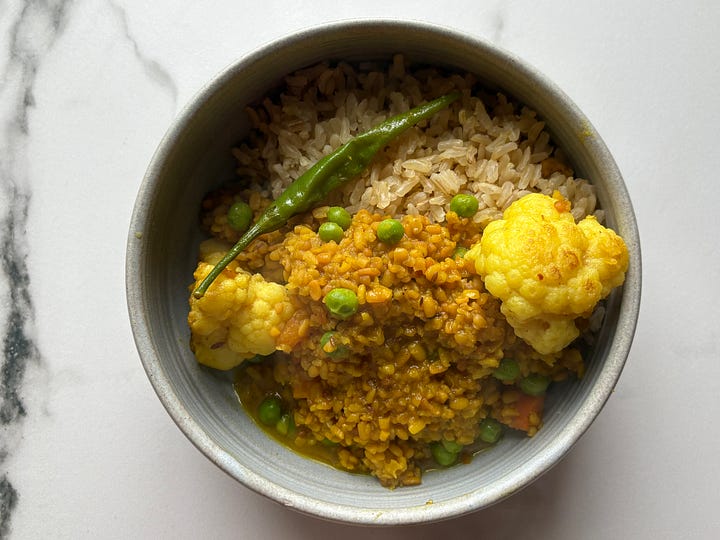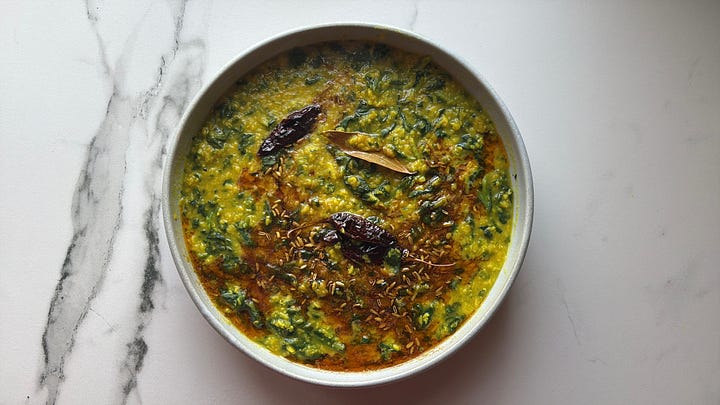The power of pulses and a push to save more food waste have been top of the agenda here. I never thought I’d manage to get the words “gassy” and “butt” into a feature about climate friendly food in Britain’s best-selling food magazine, but this is where we find ourselves. And it’s a bit of a career high point, if I’m honest. I’m now writing the Planet Friendlier features section of Good Food Magazine, commissioned by the wonderful Keith Kendrick. Managing Editor Lulu Grimes once told me that regular columns in publications were as common as hen’s teeth and so I am taking this as the sign of a nothing short of a miracle.
Jokes apart, this is a really big deal for me and my little mission. I’ve been trying to share nuggets about food sustainability for a broad audience of food lovers since I did my course at University of Cambridge in November 2023. Bringing a diverse voice to the proceedings is important to me, given my interest in global food cultures and cuisines, their people and communities. This lets me combine both of those loves - and I get to cherry pick recipes from the Good Food Archives to support my words! Result.
The power of pulses
In my debut piece, I dive into the mighty power of pulses — those humble dried beans, peas, and lentils that are game changers for our health, wallets, and the planet. I pitched it to land ahead of UN World Pulses Day on 10th Feb. Now many of us will wonder why on Earth beans need a day (or as my friend in Bombay said, what is all this beans, beans, beans nonsense). So, please read on:
🫘 Pulses are nutritional powerhouses, packed with protein, fibre, and essential micronutrients. Dr Nadia Radzman is exploring their positive mental health benefits and has a new campaign on the role of fava beans called Broad n Mind
🫘 They play a vital role in sustainable farming, enriching soil and reducing the need for synthetic fertilizers
🫘 Despite their benefits, "bean hesitancy" holds some people back from eating them because of misconceptions, misiniformation and difficulty of cooking. This can escalate to "bean resistence"
🫘 But there are simple ways to make them easy to cook and digest, and you know where to look! There are many world cuisines that centre beans and they know how to make them easy to digest and irresistible (also, ps, Britain's favourite baked beans originated in Native American tribes)
🫘 There are other ways to normalise their use in daily diets where they don't feature. Julie Lovegrove is spearheading a campaign called Raising the Pulse, which incorporates pulses into staple foods like bread to increase intake
🫘 Beans is How is a global movement pushing to double pulse consumption by 2028, as it falls off a nation’s diet as said nation gets wealthier. UK brands like Hodmedod’s are reviving homegrown varieties
The piece is in the print February issue if you fancy a read. It is supposed to be online at some point. Hope you enjoy it and eat more beans!
Get those pulses racing
I ignore most food awareness days, but I spent World Pulses Day tackling the resistance to them. We need to banish bean hesitancy. I watched the raft of posts talking about the super climate powers of pulses. But, here’s the thing. No matter how good they are for us and the planet, people still won't eat them if they don't like their taste, texture and feel uncomfortable and ill after.
So I created video content to share on my Instagram and TikTok in partnership with Good Food to tackle some of these head on. You can view it here.
In my over two decades of corporate and strategic consumer communications experience, this is the trick we used to influence - making an emotional connection. In layman's terms, it means talking to people in a way they can relate to that addresses something they really care about.
World Pulses Day may be over, but the need to pulses racing hasn’t. So let's talk / think more about how:
🍛 Delectable, varied and cheap they are
🍽️ They form the foundations of some of the most exciting and vibrant cuisines around the world; and
👩🏾🍳 We can cook/eat them so they don't cause discomfort.
Also note: I cooked a bean chilli from my head, with some Mexican ingredients. It is not a Mexican bean chilli! If you're being inspired by global cuisines please share sensitively ✌🏾.
The weely dal series
I now do a weekly dal over on my Insta if you need more recipe inspiration. The full recipes methods are on my YouTube channel, which feel like a less rushed space and I am enjoying greatly. Please come find and follow my me on these, if you don’t already!




And finally, food waste has been on the mind…
I was panellist with the excellent and at a food waste discussion with team Good Food at global media consultancy OMD, chaired by magazine stalwart Barney Desmazary. Melissa has a food waste, planet friendly cookbook called Eat Green and a new one I’m enjoying called Real Healthy.

Did you know?
Food Waste Fuels Climate Change: Globally, food waste accounts for 8–10% of greenhouse gas emissions, contributing significantly to climate change
The Hunger Paradox: It's staggering that while one-fifth of food produced for human consumption is lost or wasted globally, amounting to one billion meals a day, millions still go hungry
Wasting Food is Wasting Money: In the UK, approximately 9.5 million tonnes of food are wasted annually, costing an average of £700 per person
I discovered in a recent study that food waste is less of a developed and developing nation thing, it’s more about an urban rural divide. People in cities are not good at recycling, reusing etc. There are no prizes for guessing where most people live.
We had a spirited discussion and the three of us agreed on many fronts:
➡️ Melissa and I both agreed that the voice of mother, grandmother and ancestors were still strong and omnipresent when it comes to saving food waste. Many diverse communities grow up with saving food waste and this is a good place to seek inspiration
➡️ There was a lot of love for the freezer and labelling things properly. I use recyclable, writeable brown tape - a tip from my friend Rupy Aujla of Doctor’s Kitchen. Lulu puts her reusable ziplock bags in the dishwasher, which blew my mind…
➡️ We all have rescue recipes, which incorporate (or hide) a multitude of produce. Melissa swears by frittata and smoothies (totally putting cabbage in mine next), Lulu claimed egg fried rice, while I have a tomato curry base that pretty much anything can be dropped into.
I started becoming much more militant about saving food waste since the cost of living crisis. That £700 could get me a really nice holiday, which I could really do with. But I’ve struggled with meal planning. I don’t think I’m the only one who…
a) …struggles to find the time/motivation to make a plan
b) …struggles even more to stick to said plan
So, I’ve replaced meal planning with meal thinking, being more mindful about my food shop and being better at thinking three days ahead so I store my groceries properly. Saving food waste start before and when you shop. In fact, one of the key thing WRAP, the waste charity, campaigns for is supermarkets making it easier for people to buy what they need rather than bulk purchase. (Supermarkets are also asking the government for industry legislation to help with the amount of waste they generate btw.)
Here’s what I do:
I make a note of some recipes before I shop so I have a rough direction in which to travel
I quickly work out if I’m going to be around to cook/eat said recipes in the next few days when I’m unpacking, before they start looking sad
Stash / use things accordingly. I have supplies of grated cheddar, blocks of parmesan and chopped celery to go in my freezer
I now attempt a routine clear out. No more condiments until I use up most of the half empty jars, no bulk food shopping until the freezer is emptied etc. I highly recommend this - it’s very focusing!
What are your views on meal planning? I know some people love it (Including Melissa and Lulu) and wish I was better at it!





I was too slow to come here and vote.
My take on meal planning is that it was key to organize my work week until the pandemic knocked in and I left the office. I used to meal prepped four to five lunches on Sunday afternoon, and then I would brought them to the company fridge on Monday. I was fortunate I got a lunch stolen only once in five years. It was mind-relaxing to know that I would not need to think about lunches at work. Should I join a trip to a nearby restaurant, I would simply bring one meal back home, and I would either freeze it, or enjoy it as dinner.